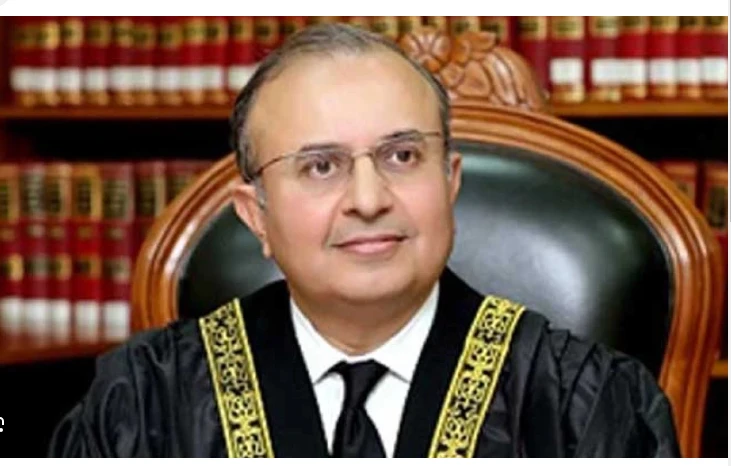Supreme Court declares ECP unlawfully denying major political party its recognition

Stay tuned with 24 News HD Android App

The Supreme Court of Pakistan on Monday issued a 70-page detailed judgment regarding the reserved seats case of the Sunni Ittehad Council (SIC) which is yet to be implemented by the Election Commission of Pakistan (ECP), reported 24NewsHD TV channel.
Apex court’s Justice Mansoor Ali Shah penned the 70-page verdict, which stated that the stakes in the general elections fundamentally lie with the people, highlighting the unique nature of election disputes compared to other civil matters.
The SC judgment aims to clarify legal principles and procedures involved in electoral issues, reinforcing the importance of a fair and transparent electoral process.
The decision said that the case before the court was not an ordinary one but was instead a matter of high public importance. The matter was not decided on the basis of assumptions but to allow the matter to be settled in a concrete matter, the verdict said.
“Instead of deciding such an important matter, which essentially relates to the right and value of the votes of millions of voters, merely on assumptions, presumptions or oral statements, this fact should be determined with certain and concrete material: (i) the written statement (declaration) by the returned candidate concerned, and (ii) its written confirmation (certificate) by PTI,” the decision reads.
The decision in the reserved seats case was announced by a full court bench on July 12. By a majority of eight judges, the bench had awarded reserved seats to the Pakistan Tehreek-e-Insaf.
Justice Syed Mansoor Ali Shah had announced the majority full court verdict, which was supported by seven other judges: Justices Munib Akhtar, Muhammad Ali Mazhar, Ayesha A Malik, Athar Minallah, Syed Hasan Azhar Rizvi, Shahid Waheed and Irfan Saadat Khan.
The case had been heard by a 13-judge full court — Chief Justice of Pakistan (CJP) Qazi Faez Isa and Justice Jamal Khan Mandokhail had penned a minority judgment; Justices Aminuddin Khan and Naeem Akhtar Afghan in their ruling had rejected the pleas for reserved seats; and Justice Yahya Afridi had also dismissed the Sunni Ittehad Council’s petitions.
The verdict stated: “When election authorities engage in actions, such as unlawfully denying the recognition of a major political party and treating its nominated candidates as independents, they not only compromise the rights of these candidates but also significantly infringe upon the rights of the electorate and corrode their own institutional legitimacy.”
“The importance of free and fair elections in a democracy cannot be overstated. The judiciary’s role in ensuring electoral integrity and upholding the will of the people is essential for sustaining public trust in the democratic process,” the order read..
Following is text of the 70-page detailed judgment:
https://drive.google.com/file/d/1rB_PI58RJGKYQdWClEkjQx-3NtOIi4oW/view?usp=sharing
The apex court, in its verdict, declared the Peshawar High Court’s (PHC) ruling in the case null and void.
Similarly, it said that the Election Commission of Pakistan’s (ECP) decision, dated March 1, 2024, was also in breach of the constitution.
It was written in the judgment that the PTI’s argument was that the people voted for the independent candidates merely because they belonged to the PTI. “PTI is a political party,” read the verdict.
The SC also said that it was really unfortunate that of total 13 judges, who were included in its full-court bench, eight had given the ruling in favour of granting the reserved seats to the PTI, while two judges asked the ECP not to implement the decision.
The apex court said that two honourable judges namely Justice Naeem Akhtar Afghan and Justice Ameenuddin Khan released their dissenting note on August 3, which really hurt. “These judges wrote that the SC’s July 12 majority decision was not in accordance with the constitution. The remarks they made were unbecoming of the SC judges.”
It was further written that their comments amounted to obstructing the provision of justice.
It was further stated that the court tried to understand how such a large number of independent candidates managed to make it to the National and provincial assemblies in the February 8 general assemblies. “But the court could not be satisfied.”
The SC said that the ECP failed to discharge its duties. “The PTI is entitled to the reserved seats,” it stated and ordered the election commission to notify the PTI candidates for reserved seats in the National Assembly.
The SC declared section 94 of the Election Rules against the constitution and null and void.
It added that ECP, which was supposed to hold free, fair and transparent elections, failed in its job on February 8. “The election commission is a guarantor of democracy and is a fourth pillar of the state. But unfortunately, it acted like a party to the case.”
The apex court said that in several cases, it had made it clear that it was not bound to follow technicalities while providing justice.
It went on to say that had the constitutional rights of the PTI been clearly defined in the electoral symbol case, such ambiguities would not have raised their head.
The eight-judge order also expressed “some doubts about whether the Commission has the power to reject the certificate of intra-party elections submitted by a political party under Section 209, and whether the Commission exercised its discretion under Section 215(5) justly, fairly and reasonably in PTI’s case, adding “fundamental right of citizens to vote for the political party of their choice was at stake”.
“Similarly, we have certain reservations about how the matter of intra-party elections — a matter of internal governance of party — can trump the fundamental rights of citizens to vote and of political parties to effectively participate in and contest elections through obtaining a common symbol for their candidates, guaranteed under Articles 17(2) and 19 of the Constitution.
Reporter Amanat Gishkori
